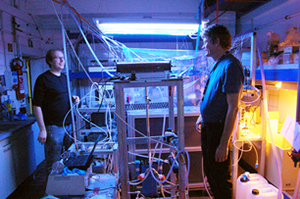9.12.16 | A two-week series of experiments to investigate the properties of aerosols has been successfully completed at the ZMT. The experiments are part of the MarParCloud* project funded by the Leibniz Association, and the participating institutions are the Leibniz Institute for Tropospheric Research (TROPOS), the Leibniz Centre for Tropical Marine Research (ZMT), the Leibniz Institute for Baltic Sea Research Warnemünde (IOW) and the Universities of Oldenburg and Hamburg. Dr Enno Bahlmann (working group Carbon and Nutrient Cycles at the ZMT), who led the series of experiments, and PhD student Markus Hartmann (TROPOS) succeeded in replicating the natural ocean conditions in the laboratory. The next step will be to evaluate the measurements.
Marine aerosols – submicron particles suspended in air above the ocean surface – can directly and indirectly influence the radiation balance of the Earth through the absorption and reflexion of incident solar radiation. Marine aerosol particles can arise in different ways, for example through interactions between the ocean and the atmosphere, and can be changed by their environmental conditions.
One of the important processes in the formation of marine aerosols is "bubble bursting", whereby compounds from the sea water are introduced directly into the atmosphere by bursting air bubbles at the ocean surface. Furthermore, the emission of volatile compounds from the seas plays an important role in aerosol formation.
In the experimental setup at the ZMT, the scientists investigated the physical properties of saltwater aerosols as to size or number, but also investigated their chemical composition. Besides salts, these aerosols also contain fats, sugars and proteins from the sea.
“The results of the series of experiments shall later be incorporated into the modelling, in order to better understand cloud formation,” said Dr Bahlmann.
The researchers want to finish evaluating their data by the end of February. At the same time, their series of experiments shall serve for the upcoming field study, which is planned to take place in Cape Verde in September.
For more information on the MarParCloud research project, please click here.
*(Marine biological production, organic aerosol particles and marine clouds: a process chain)

 Contacts
Contacts
PD Dr. Tim Rixen
+49 (0)421 23800 - 55This email address is being protected from spambots. You need JavaScript enabled to view it.




